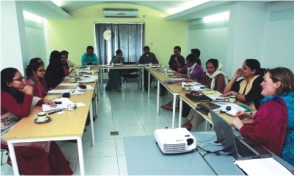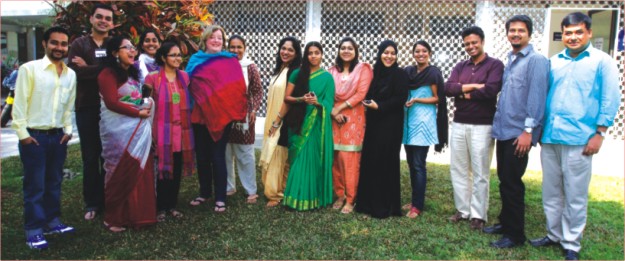Workshop
Addressing a Global Audience
Rakibul Hasan
Nobel laureate Rabindranath Tagore inspired people around the world to find unity in diversity through intercultural dialogues between the East and the West. As Tagore's perception on being a global citizen still bears a strong relevance to the harmonisation of the contemporary world, the British Council arranged a two-day Tagore inspired creative writing workshop for the emerging young writers from Bangladesh, who desire to write in the English language. The workshop took place from 9 to 10 February 2011. It marked the beginning of British Council's four-month long Tagore festival titled 'Rediscovering Tagore', on the occasion of Tagore's 150th birth anniversary. The workshop was conducted by Julia Bell, a novelist and creative writing specialist from the UK. A senior lecturer at Birkbeck College, University of London, Bell has published two novels and has also written and co-edited the bestselling 'Creative Writing Coursebook'. Participants at the workshop were encouraged to try out their own ideas and storylines and share their views with Julia Bell, who in turn interpreted her experiences and certain techniques on writing to the aspiring writers.
 |
The workshop on creative writing facilitated the students to get over their apprehension on expressing themselves to a larger audience. Courtesy : British Council. |
English as a language has become a gateway to becoming acquainted to diverse cultures. The creative writing workshop was aimed at encouraging the aspiring writers to write more in English along with a focus on the techniques of translation. It certainly helped the participants to delve deeper into the world of creative writing and to learn certain techniques for translating literary texts in their own unique way. For some participants, the workshop helped to break the threshold to explore the world of creative writing in English. Umme Kulsum, a university lecturer of English Literature and a participant at the workshop, shares her experience saying, “My first encounter with literature was in Bangla. But as I get in touch with the world of English literature, I choose to convey my creative instincts in English. I believe writing in English will allow me to represent my locality and culture to a pluralistic world."
The workshop on creative writing facilitated the students to get over their apprehension on expressing themselves to a larger audience. “The first drill that we practiced was to write about our fears and then tossing it away. So the workshop helped me in a number of ways to go beyond my fears and try out different ideas in writing,” says Afia Alam, a university student and a participant at the workshop. The workshop included several drills and engaging sessions where the participants experimented with different ways to develop a character as well as techniques of using first and third persons in writing. The workshop began with an ice-breaking exercise between the tutor and the participants as they talked about the meaning of their names. The drill was followed by stimulating exercises which made the writers think about the purpose behind their writing, what generates an idea and how one can unveil an image to understand crucial details. An in-depth session on the techniques of translations across borders, time zones and languages was one of the most engaging segments at the workshop. Going through some exercises, the writers discussed about how much of the original literary elements can be retained and how much gets lost in translation when a writer takes up a foreign story.

Participants at the workshop, Courtesy : British Council.
The theme of the workshop was 'Crossing boundaries', a notion close to Tagore's heart. According to Julia Bell, a Tagore enthusiast, Tagore's writing is an excellent example of the qualities required for any aspiring writer, as the great poet writes in different voices and one can discover brilliant writing examples by reading between the lines of Tagore's poetry. Through his life and works, Tagore advocated the idea of looking beyond particular material and abstract boundaries. The poet always believed that achievement of true unity between the east and the west can only be possible through celebrating the diversity within human beings by holding intercultural dialogues. However, the notion of crossing boundaries can vary from person to person. Munize Manzoor, a teacher of English and a participant at the workshop, elucidates her perception on the notion of crossing boundaries. “As a Bangladeshi woman in 2011, I may have to face boundaries like national borders, gender and age. But the workshop on creative writing assisted me to overcome these barriers and it provided me with the opportunity to express my thoughts more openly to a team of creative writers,” says Manzoor.
The workshop helped these aspiring writers to exchange views and gather newer ideas in an open, creative environment. “Up till the workshop, I was quite hesitant to express my views in print but after attending the engaging discussions with a group of talented people, I believe I have been successful to recover from my literary stagnancies. There may be certain ideas and techniques which I may have known previously but I was not confident enough to try them out in my writings," says Anika Islam, a university student and a participant at the workshop. Sadia Ahmed Khan, another participant at the workshop thinks the discussion and exchange of the view in the workshop gave her new insights on creative writing. “Previously I would often give names to my characters almost randomly but now I would choose to do a bit of research before naming any of my characters as the workshop persuaded me to look deeply into the key ingredients in developing a convincing character,” says Sadia.
Participants at the workshop read out some of their works to the group of writers, who in turn helped them evaluate their works through literary debates and discussions. Talking about her experience at the workshop, Julia Bell says, “As a trainer I can't teach people to be interested. But there are certain techniques which allow the writer to share his or her experience with readers more clearly and naturally”. According to Julia Bell, the literary standards of the works produced by the participants have been very high. She encouraged them to strive on till they get to be published. Julia also asserted that she would definitely like to publish some of the genuine writer's work in 'Brikbeck Writer's Hub', a web portal of which she is a co-ordinator. The British Council jointly hosted a showcasing event with Bangla Academy on this February 21 in 'Amar Ekushey Boi Mela”, where the outcomes of the workshop were put forth.
The engaging discussions and exchange of ideas between the writers from both home and abroad have certainly assisted the participants to open up to the new ideas and to improvise their writing skills. From the literary experience at the workshop, the participants can now, readily and confidently, share their thoughts with a global audience.
|
